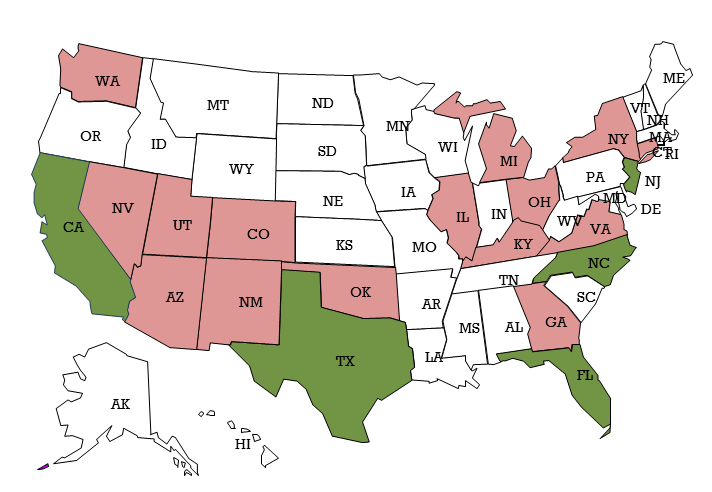Shifting Campus Culture through Mentoring
Published by: WCET | 5/10/2018
Tags: Access, Assessment, Collaboration/Community, Completion, Data And Analytics, Evaluation, Faculty, Innovation, Research, Student Success
Published by: WCET | 5/10/2018
Tags: Access, Assessment, Collaboration/Community, Completion, Data And Analytics, Evaluation, Faculty, Innovation, Research, Student Success
Today’s post is an important example of how a campus culture can impact student success. WCET is happy to share this post from Sarah Torres Lugo, Research Assistant with NCHEMS and the Foundation for Student Success. Sarah is here to discuss a Foundation for Student Success project which connects model (mentor) institutions with other institutions (who become mentees) which may require a campus cultural shift to impact equity and equality of education for their campus. The group is excited to share what they’ve learned from these mentor/mentee relationships.
Thank you, Sarah, for writing this great post for us today. We’re looking forward to following this project in the future!
~Lindsey Downs, WCET
What are the key levers for shifting campus cultures to eliminate the equity gap in postsecondary education? Can this culture shift result in an increase in overall student success? Through our continuing partnership with our mentor and mentee institutions, we at the Foundation for Student Success are working towards identifying and sharing critical elements of effective student success movements.
Founded in 2016, the Foundation for Student Success (FSS), housed at the National Center for Higher Education Management Systems (NCHEMS) in Colorado, launched its first project in the Fall of 2016. The project began by identifying a small group of community colleges and public universities whose student success rates were higher than their input variables, such as Pell eligibility and high school grades of their students, predicted. The leaders at these institutions were interviewed and seven institutions were selected as mentors. Mentor leads were then identified by each mentor campus. FSS mentors include three Provosts, two Vice Presidents for Student Affairs, a Dean of Student Success, a Dean of Institutional Equity and Inclusion, an Executive Director of Academic Success and Equity Initiatives, a Vice Chancellor for Academic Programs and Services, an Assistant Provost, and a Dean of Student Development. The selected institutions have at least 25 percent American Indian, Black, and/or Latino students. The mentor institutions were then matched with three demographically similar mentee institutions—we refer to the group of one mentor institution and three mentee institutions as a pod. The mentee institutions are in very different places on their journey to cultivate the campus culture that best supports student success and this variation reflects campus realities across the nation.
The following map indicates the geographic distribution of the mentors (darker shade) and mentees (lighter shade).

Once we matched mentor and mentee institutions, each of the seven mentors invited teams from their three mentee institutions to the mentor institution campus. The leads at each of the seven mentor institutions were in charge of creating the agenda and arranging the meeting so that the mentee teams would have an opportunity to hear from and speak with those that have been most involved in the mentor institution’s efforts to improve the way they serve students. All mentor campus visits took place between March 22, 2017 and April 28, 2017.
We have since facilitated and tracked interactions among the pods of institutions as they work together to reach their self-defined goals towards changing the culture of their campuses in order to reduce equity gaps and increase overall student success. As a means to share lessons from mentor and mentee campuses, FSS is featuring the 2018 webinar series titled “Engaging in Tough Conversations Toward Equitable Student Success”. The series kicked off with a webinar about the realities of student demographics shifts.  Two mentor and two mentee institutions shared their institutions’ journeys toward an understanding of the shifting student demographics on their own campuses, why these shifts matter, what steps they have taken and are planning to take in pursuit of equitable educational outcomes for their students, and what strategies have and have not worked. While institutions participating in the FSS project are learning from one another, we are also learning a tremendous amount. One of the aspects we are learning about and are codifying is the critical role data plays in cultivating a campus culture that promotes equitable educational outcomes.
Two mentor and two mentee institutions shared their institutions’ journeys toward an understanding of the shifting student demographics on their own campuses, why these shifts matter, what steps they have taken and are planning to take in pursuit of equitable educational outcomes for their students, and what strategies have and have not worked. While institutions participating in the FSS project are learning from one another, we are also learning a tremendous amount. One of the aspects we are learning about and are codifying is the critical role data plays in cultivating a campus culture that promotes equitable educational outcomes.
During the “Shifting Student Demographics Matter— How to Start the Campus-Wide Conversation” webinar, we heard from Van Wigginton, San Jacinto College Provost, and Shelley Rinehart, Dean of Student Development at San Jacinto’s Central Campus, about the transformative change their institution experienced when the institution’s focus on enrollment data was shifted to a commitment to student success and completion that involved every employee. That change in focus necessitated the disaggregation of data and has brought the institution into the space of using predictive analytics to identify and eliminate barriers to student success. Without doubt, underlying this shift in focus and commitment is the recognition that there is a shared responsibility for student success between students and all institutional actors.
We heard Quill Phillips, Special Assistant to the President for Inclusive Excellence at the Community College of Aurora (CAA), describe CCA’s work towards shifting the campus culture using an inclusive excellence framework and equity mindset. Quill spoke about the fascinating 2013 journey they embarked on with the Center for Urban Education at the University of Southern California. CCA’s math department piloted the Equity in Excellence action research process during which the math department looked at their student success data disaggregated by race/ethnicity and gender. This process enabled the math department to identify disparities, raise awareness of achievement gaps, and motivate individuals and units to seek strategies and change practices in order to better serve their students. Core to the process is the idea that the solution to the problem “lies within the institution—in its culture and in the beliefs and values that influence the expectations and practices of individuals” (Massey et al. 2005, p.40). We have similarly heard from all of our mentors, repeatedly, that there is no silver bullet or secret sauce behind the reduction of equity gaps.
CCA demonstrates an understanding that not a single change in practice or tool will bring about the desired outcomes with their efforts in creating a sustainable structure supported by various intentional steps they have taken. Such steps include intensifying the Center for Urban Education work through the Equity in Instruction Leadership Academy. Through the cohort-based academy, full-time faculty are taken through the entire Center for Urban Education protocol which includes delving into the data of their own course with the largest performance gaps and then looking into areas where improvements can be made such as the syllabus and the instructor’s implicit biases that may impede a student’s learning process. Given the positive results that CCA has had with the Equity in Instruction Leadership Academy and the common exclusion of adjunct faculty in professional development programs, it is encouraging to hear that CCA will be extending participation to adjunct instructors next semester.
Paul Dosal, University of South Florida’s (USF) Vice President for Student Affairs and Student Success, shared the story of their student success path that took off in 2009. To address the student success challenges that USF faced, the Student Success Task Force was launched. This task force was intentionally composed of 100 individuals representing all units in order to ensure university-wide contributions to the student success movement. This task force was divided into eight core groups and in 2010 the task force produced a lengthy set of actionable and prioritized set of recommendations that have served as a blueprint for USF’s student success movement. One of the three fundamental reforms proposed was building USF’s research capacity to support student success initiatives. In expanding USF’s research capacity, USF identified a need for a guiding body to use data and determine/implement needed policy and process changes. As a result, USF formed the Persistence Committee to focus attention on the performance of all students. USF uses predictive analytics to identify struggling students and those who could benefit from correctly timed interventions. The committee is comprised of approximately two dozen staff from across the institution that work together to adjust practices in order to eliminate barriers to student success, which are identified through USF’s continuously improved, and truly remarkable, analytics-driven case management system.
Southern Connecticut State University’s (SCSU) Associate Vice President for Enrollment Management discussed SCSU’s collection of data through focus groups with students, faculty, and other stakeholder groups as well as through the President’s Commission on Social Justice Survey to broaden their work to include more intentional strategies to improve campus culture and to prepare for the continuing changes in student demographics. Some of the insights from the data gathering process were surprising to some and served as the impetus for developing intentional strategies to address well-established cultural norms that are not reflective of SCSU’s commitment to social justice. Efforts for expanding access and usage of student success data across campus are underway and data are being used to foster strategic partnerships with high school and community college partners. SCSU will be hosting a Regional Summit in the Fall of 2018, where they will bring together high school partners, community college partners, school districts, government officials, business leaders, community leaders, Department of Labor representatives, and experts on racial issues to develop an action strategy plan to support more students of color in the community that aspire to earn a Bachelor’s degree.  Underlying this convening is an understanding that the degree attainment agenda is a joint imperative to ensure the vitality of their citizens and their economy. The use of credible data will certainly help create the impetus needed to develop the action strategy plan.
Underlying this convening is an understanding that the degree attainment agenda is a joint imperative to ensure the vitality of their citizens and their economy. The use of credible data will certainly help create the impetus needed to develop the action strategy plan.
NCHEMS staff will continue to facilitate and track interactions among the pods of institutions as they work together to reach their self-defined goals towards reducing equity gaps on their campus. We will continue to share lessons being learned through three more webinars, summaries of interviews with mentee institution leaders, and white papers.
Learn more about FSS and check out our Mentor Case Studies, information about the webinar series, a video recording of the webinar discussed above, a link to register for the May 23, 2018 “Who Owns Student Success on Your Campus?” webinar, and more.

Sarah Torres Lugo
Research Assistant,
NCHEMS Staff,
Foundation for Student Success
References
Bauman, G.L., Tomas Bustillos, L., Bensimon, E.M., Brown, M.C., & Bartee, R.D. (2005). Achieving Equitable Educational Outcomes with All Students: The Institution’s Roles and Responsibilities. Association of American Colleges and Universities. https://www.aacu.org/sites/default/files/files/mei/bauman_et_al.pdf
Sandoval-Lucero, E., White, T. D., Haynes, D. E., Phillips, Q., Brame, J. D., & Sturtevant James, K. A., (2017). Engaging inclusive excellence: Creating a college with an equity mindset. In L. Leavitt, S. Wisdom, & K. Leavitt (Eds.), Cultural Awareness and Competency Development in Higher Education, (pp. 40-60). Hershey, PA: IGI Global.
